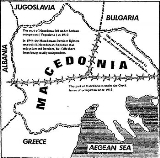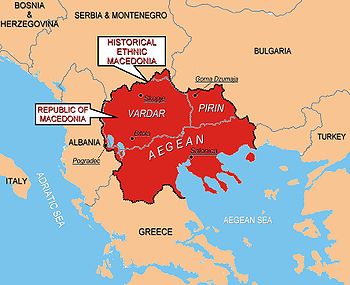
United Macedonia
Encyclopedia


Irredentism
Irredentism is any position advocating annexation of territories administered by another state on the grounds of common ethnicity or prior historical possession, actual or alleged. Some of these movements are also called pan-nationalist movements. It is a feature of identity politics and cultural...
concept among ethnic Macedonian
Macedonians (ethnic group)
The Macedonians also referred to as Macedonian Slavs: "... the term Slavomacedonian was introduced and was accepted by the community itself, which at the time had a much more widespread non-Greek Macedonian ethnic consciousness...
nationalists
Nationalism
Nationalism is a political ideology that involves a strong identification of a group of individuals with a political entity defined in national terms, i.e. a nation. In the 'modernist' image of the nation, it is nationalism that creates national identity. There are various definitions for what...
that aims to unify the transnational region of Macedonia in southeastern Europe
Balkans
The Balkans is a geopolitical and cultural region of southeastern Europe...
, which they claim as their homeland, and which they assert was wrongfully divided under the Treaty of Bucharest in 1913, into a single state under Slavic domination with the city of Thessaloniki
Thessaloniki
Thessaloniki , historically also known as Thessalonica, Salonika or Salonica, is the second-largest city in Greece and the capital of the region of Central Macedonia as well as the capital of the Decentralized Administration of Macedonia and Thrace...
(Solun in the Slavic languages) as its capital.
History of the concept
The concept of a United Macedonia appeared initially in the late 19th century as variant called authonomous Macedonia in the documents of the Internal Macedonian Revolutionary Organization. The organization was founded in 1893 in Ottoman ThessalonikiThessaloniki
Thessaloniki , historically also known as Thessalonica, Salonika or Salonica, is the second-largest city in Greece and the capital of the region of Central Macedonia as well as the capital of the Decentralized Administration of Macedonia and Thrace...
by a "small band of anti-Ottoman Macedono-Bulgarian revolutionaries, which considered Macedonia an indivisible territory and claimed all of its inhabitants Macedonians, no matter their religion or ethnicity. The idea then was strictly political and did not imply a secession from Bulgarian ethnicity, but unity of all nationalities in the area. The term United Macedonia has been in use since the early 1900s, notably in connection with the Balkan Socialist Federation.
Although the following perception is not limited to ethnic Macedonians, or nationalists, the majority of ethnic Macedonians usually break down the region of Macedonia as follows, a categorisation which is considered offensive by itself by both Greeks:
- Vardar MacedoniaVardar MacedoniaVardar Macedonia is an area in the north of the Macedonia . The borders of the area are those of the Republic of Macedonia. It covers an area of...
(Вардарска Македонија) - the Republic of MacedoniaRepublic of MacedoniaMacedonia , officially the Republic of Macedonia , is a country located in the central Balkan peninsula in Southeast Europe. It is one of the successor states of the former Yugoslavia, from which it declared independence in 1991...
. - Aegean Macedonia (Егејска Македонија) - the three Macedonian peripheriesMacedonia (Greece)Macedonia is a geographical and historical region of Greece in Southern Europe. Macedonia is the largest and second most populous Greek region...
of northern Greece. - Pirin Macedonia (Пиринска Македонија) - the unofficial name of Blagoevgrad ProvinceBlagoevgrad ProvinceBlagoevgrad Province , also known as Pirin Macedonia , is a province of southwestern Bulgaria. It borders four other Bulgarian provinces to the north and east, Greece to the south, and the Republic of Macedonia to the west. The province has 14 municipalities with 12 towns...
in southwestern Bulgaria - Mala Prespa and Golo BrdoMala Prespa and Golo BrdoPrespa e Vogël and Golloborda , refers to a geographical area situated in southeastern Albania. This region consists of two areas: Prespa e Vogël and Golloborda...
(Мала Преспа и Голо Брдо) - an area in southeastern Albania (sometimes considered to be a part of Aegean Macedonia). - Prohor PchinskiProhor PcinjskiProhor Pčinjski is an 11th-century Serbian Orthodox monastery in the deep south of Serbia, located in village Klenike, Pčinja District near the border with Macedonia...
(Прохор Пчински) - in southern SerbiaSerbiaSerbia , officially the Republic of Serbia , is a landlocked country located at the crossroads of Central and Southeast Europe, covering the southern part of the Carpathian basin and the central part of the Balkans...
, (this subregion is considered to be a part of Vardar Macedonia). - GoraGora (region)Gora is a geographical region in southern Serbia and northeastern Albania, inhabited by Albanians and a Gorani minority. The name "Gora" is a Slavic word for "mountain" or "forest"....
(Гора) - in southern KosovoKosovoKosovo is a region in southeastern Europe. Part of the Ottoman Empire for more than five centuries, later the Autonomous Province of Kosovo and Metohija within Serbia...
(this subregion is also considered to be a part of Vardar Macedonia).
An essential aspect of this concept is the claim that the vast majority of the population in those territories are oppressed ethnic Macedonians and they describe those areas as the unliberated parts of Macedonia. In the cases of Bulgaria and Albania, it is said that they are undercounted in the censuses (In Albania, there are officially 5,000 ethnic Macedonians, whereas Macedonians nationalists claim the figures are more like 120,000-350,000. In Bulgaria, there are officially, 5,071 ethnic Macedonians, whereas Macedonian nationalists claim 200,000 ). In Greece, there is a Slavic-speaking minority with various self-identifications (Macedonian, Greek, Bulgarian), estimated by Ethnologue
Ethnologue
Ethnologue: Languages of the World is a web and print publication of SIL International , a Christian linguistic service organization, which studies lesser-known languages, to provide the speakers with Bibles in their native language and support their efforts in language development.The Ethnologue...
, and the Greek Helsinki Monitor as being between 100,000-200,000 (according to the Greek Helsinki Monitor only an estimated 10,000-30,000 have an ethnic Macedonian national identity ). Macedonian nationalists have claimed that there is a Macedonian minority numbering up to 800,000.
The roots of the concept can be traced back to 1910. One of the main platforms from the First Balkan Socialist Conference in 1910 was the solution to the Macedonian Question, Georgi Dimitrov
Georgi Dimitrov
Georgi Dimitrov Mikhaylov , also known as Georgi Mikhaylovich Dimitrov , was a Bulgarian Communist politician...
in 1915 writes that the creation of a "Macedonia, which was split into three parts, was to be reunited into a single state enjoying equal rights within the framework of the Balkan Democratic Federation".
The concept about United Macedonia was used by revolutionaries from the Internal Macedonian Revolutionary Organization (IMRO) too. In 1920-1934 their leaders - Todor Alexandrov, Aleksandar Protogerov
Aleksandar Protogerov
Alexandar Protogerov was a Bulgarian general, politician and revolutionary as well as a member of the revolutionary movement in Macedonia, Thrace and Pomoravlje. He was among the leaders of the Supreme Macedonian-Adrianople Committee and later joined the Internal Macedonian Revolutionary...
, Ivan Mihailov
Ivan Mihailov
Ivan Mihailov Gavrilov , was a Bulgarian revolutionary in Ottoman and interwar Macedonia, and leader of the Internal Macedonian Revolutionary Organization after 1924.-Early years:...
, etc., accept this concept with the aim to liberate the territories occupied by Serbia and Greece and to create Independent and United Macedonia for all Macedonians, Bulgarians, Greeks, Serbians, Albanians, etc. Bulgarian government of Alexander Malinov in 1918 offered to give Pirin Macedonia to such a United Macedonia after World War I
World War I
World War I , which was predominantly called the World War or the Great War from its occurrence until 1939, and the First World War or World War I thereafter, was a major war centred in Europe that began on 28 July 1914 and lasted until 11 November 1918...
, but the Great Powers did not adopt this idea, because Serbia and Greece opposed. Bulgarian government again in 1945 offered to give Pirin Macedonia to such a United Macedonia after World War II
World War II
World War II, or the Second World War , was a global conflict lasting from 1939 to 1945, involving most of the world's nations—including all of the great powers—eventually forming two opposing military alliances: the Allies and the Axis...
.
The idea of a United Macedonia under Communist rule was abandoned in 1948 when the Greek Communists lost in the Greek Civil War
Greek Civil War
The Greek Civil War was fought from 1946 to 1949 between the Greek governmental army, backed by the United Kingdom and United States, and the Democratic Army of Greece , the military branch of the Greek Communist Party , backed by Bulgaria, Yugoslavia and Albania...
, and Tito fell out with the Soviet Union and pro-Soviet Bulgaria.
Before and just after the Republic of Macedonia's independence, it was assumed in Greece that the ideology of a United Macedonia was still state-sponsored. In the first constitution of the newly independent Republic of Macedonia, adopted on 17 November 1991, Article 47 read as follows :
The Republic cares for the status and rights of those persons belonging to the Macedonian people in neighboring countries, as well as Macedonian expatriates, assists their cultural development and promotes links with them. In the exercise of this concern the Republic will not interfere in the sovereign rights of other states or in their internal affairs' The Republic cares for the cultural, economic and social rights of the citizens of the Republic abroad.
This was seen in Greece as a declaration of a right to interfere in Greece's internal affairs.
Finally, on 13 September 1995, the Republic of Macedonia signed an Interim Accord with Greece in order to end the economic embargo
Embargo
An embargo is the partial or complete prohibition of commerce and trade with a particular country, in order to isolate it. Embargoes are considered strong diplomatic measures imposed in an effort, by the imposing country, to elicit a given national-interest result from the country on which it is...
Greece had imposed, amongst other reasons, for the perceived land claims. Amongst its provisions, the Accord specified that Macedonia would renounce all land claims to neighboring states' territories.

See also
- Macedonia (terminology)Macedonia (terminology)The name Macedonia is used in a number of competing or overlapping meanings to describe geographical, political and historical areas, languages and peoples in a part of south-eastern Europe. It has been a major source of political controversy since the early 20th century...
- Demographic history of MacedoniaDemographic history of Macedonia- Early history :The region of Macedonia is known to have been inhabited since Paleolithic times. Early historical inhabitants of the region were the Ancient Macedonians, Phrygians, Thracians and Illyrians. Thracians in early times occupied mainly the eastern parts of Macedonia but were also...
- Internal Macedonian Revolutionary Organization
- History of the Republic of MacedoniaHistory of the Republic of Macedonia- Ancient period :In antiquity, most of the territory that is now the Republic of Macedonia was included in the kingdom of Paeonia, which was populated by the Paeonians, a people of Thracian origins, but also parts of ancient Illyria and Dardania, inhabited by various Illyrian peoples, and...
- Macedonism
- TitoismTitoismTitoism is a variant of Marxism–Leninism named after Josip Broz Tito, leader of the Socialist Federal Republic of Yugoslavia, primarily used to describe the specific socialist system built in Yugoslavia after its refusal of the 1948 Resolution of the Cominform, when the Communist Party of...

